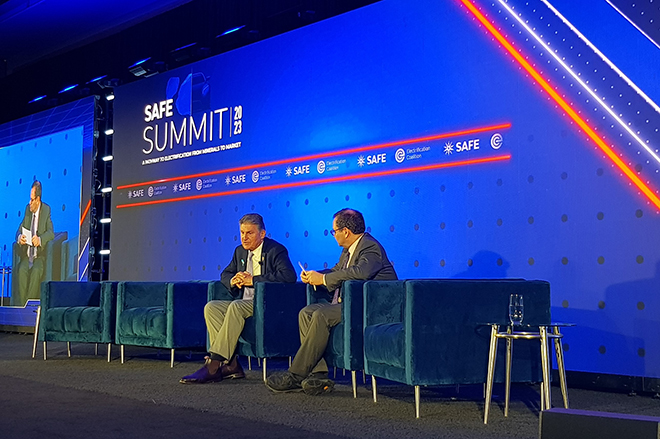S&P Global Offerings
Featured Topics
Featured Products
Events
S&P Global Offerings
Featured Topics
Featured Products
Events
S&P Global Offerings
Featured Topics
Featured Products
Events
Banking & Capital Markets
Economy & Finance
Energy Transition & Sustainability
Technology & Innovation
Podcasts & Newsletters
Banking & Capital Markets
Economy & Finance
Energy Transition & Sustainability
Technology & Innovation
Podcasts & Newsletters
S&P Global Offerings
Featured Topics
Featured Products
Events
30 Mar, 2023

By Camellia Moors

| Sen. Joe Manchin (D-W.Va.), left, speaks at the SAFE Summit in Washington, DC, on March 29. Source: S&P Global Commodity Insights. |
US Sen. Joe Manchin (D-W.Va.) said March 29 that he would try to sue the Biden administration if it allows too much of the critical mineral processing for electric vehicles qualified for tax credits to happen overseas.
Manchin, chair of the Senate Energy and Natural Resources Committee and a key backer of the Inflation Reduction Act, has been fuming for weeks about the Biden administration's broad interpretation of "processing" in its Clean Vehicle Credit incentives, which could open up more of the manufacturing process to other countries and leave only the final assembly to US companies.
The incentives are tied to the sources of the critical minerals used in an EV's battery and the final assembly location of a vehicle. Beginning this year, a vehicle can only qualify for the full $7,500 credit if 40% of its battery's critical minerals and 50% of the overall value of its battery components came from the US or countries with whom the US has a free-trade agreement. The vehicle's final assembly must also take place in North America.
"Does it mean basically the processing of the raw product into a form that we can take and put in manufacturing, or is it basically the making the powders, and the wafers, and everything that we need ... and calling that processing?" Manchin asked while speaking on a panel at the SAFE Summit, a conference on EVs in Washington, DC.
"You do that, and we don't meet our objective of being self reliant ... I'm willing to go to court, I'm willing to stop it all. Because that's not the intent [of the Inflation Reduction Act]."
The Treasury Department and the Internal Revenue Service are expected to release detailed guidance on the Clean Vehicle Credit by March 31. It will likely include the definition of processing for critical minerals, which will impact the provenance of EV battery materials as well as final assembly locations for vehicles to qualify for the tax credit.
Manchin said he is open to sourcing battery materials from the US' trading partners, so long as more than the final assembly of a vehicle is completed in the US.
"I don't have a problem opening up to our reliable trading partners," Manchin said. "France, the UK, the EU — I'm fine with processing in those areas. I'm just not fine with [those countries] completing the project and all we're going to do is end up assembling in the US. That is not the bill, that's not how we wrote it, and it's not how it should be implemented."
Manchin's comments came shortly after the US announced agreements with Japan and the EU, which could open up Inflation Reduction Act tax credits to vehicles using materials from those regions, even though the US does not have free-trade agreements with either.
Speaking to reporters after the event, Manchin acknowledged he did not yet know if he could go to court over the agencies' Clean Vehicle Credit guidance.
"I'll do whatever I can," said Manchin. "If that means going to court and I can do it, I'll do it. I don't know if I can or not, but I'll do it if I'm allowed to."
S&P Global Commodity Insights produces content for distribution on S&P Capital IQ Pro.
